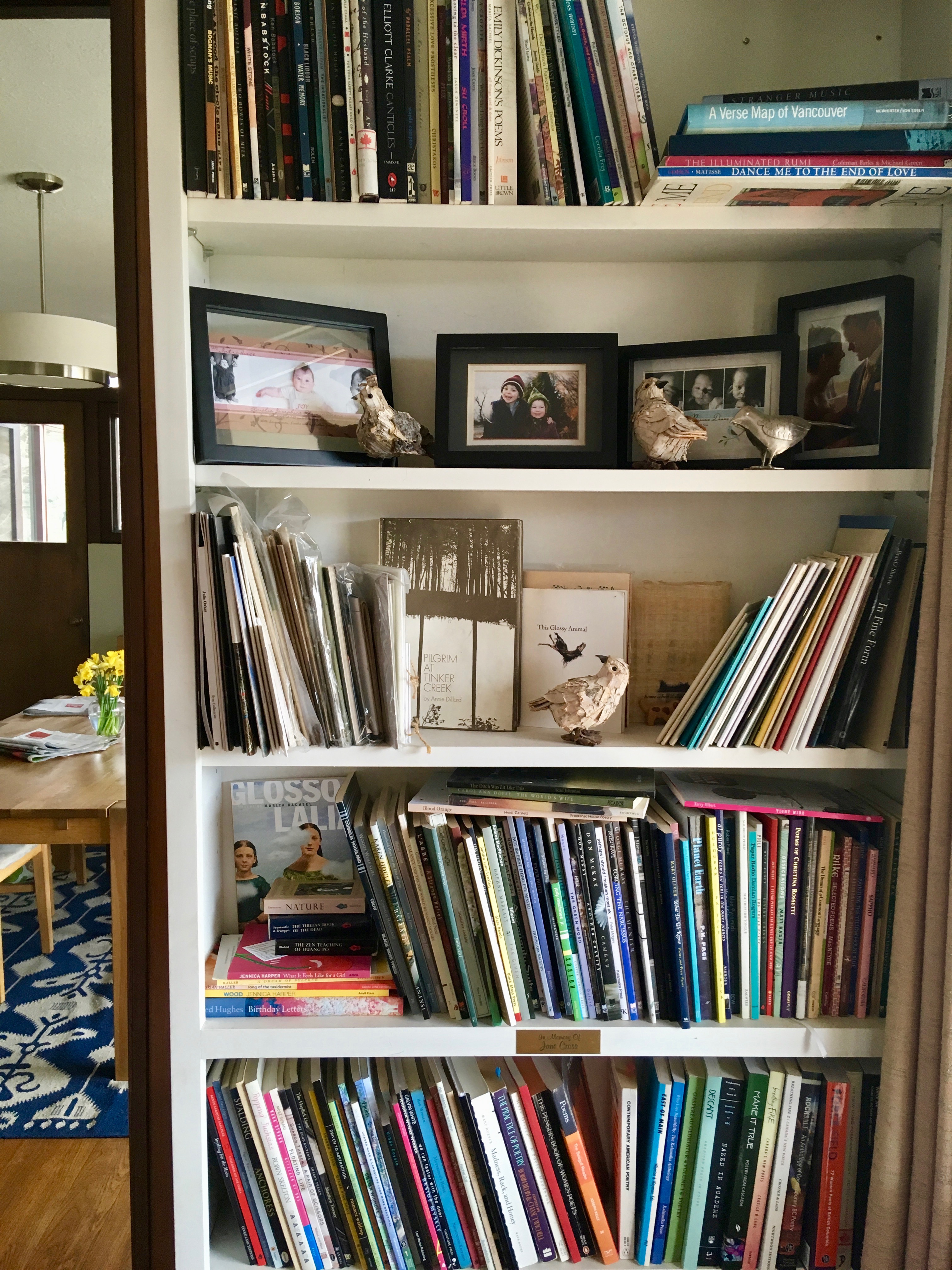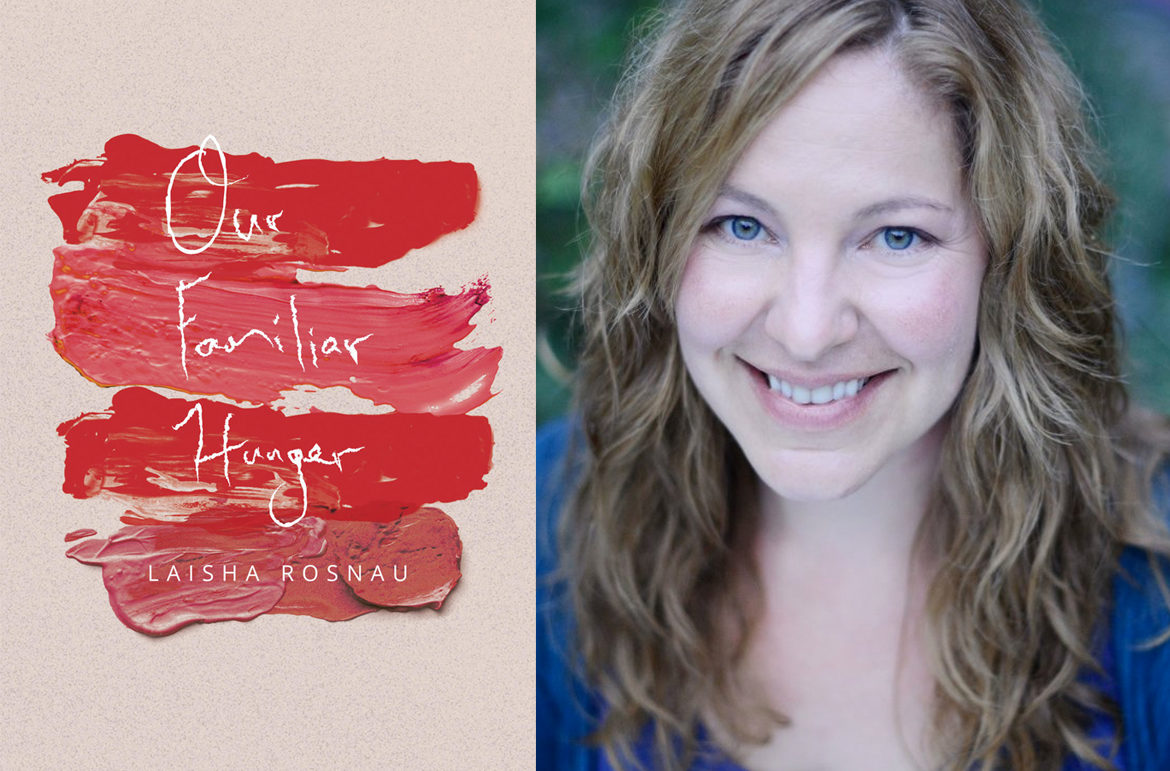Poetic Licence is a special Read Local BC column for National Poetry Month. Each column features one poet and a snapshot into their bookish world. Laisha Rosnau is an award-winning poet and novelist; her latest book is Our Familiar Hunger, a poetry collection with Nightwood Editions.
How do you write your first draft of a poem — by hand, on a computer, in your head?
A combination – I’ll often “hear” a line or see an image while I’m out walking or biking, but it doesn’t often go beyond that. Writing – pen to paper or fingertips to keyboard – is an essential part of the process for me. I used to write most first drafts with pen and paper then subsequent drafts on the computer. Now, most first drafts go straight on to my laptop, though if I want to change things up I’ll go back to pen and paper.
How much do you edit/rewrite a poem, and how do you decide when it’s done (or good enough)?
I rewrite and revise extensively, repeatedly, compulsively, continually. The longest time between first draft and publication, so far, was twenty years. I’ll still take pencils to my published work and keep editing it on the already printed and bound page. There’s always something. I relate to the “no work of art is ever finished, only abandoned” school of thought (that quote has been ascribed to several different people) – I’ll rewrite, revise, edit, repeat until I get sick of something and then think, “Sod it; I need to get this out of the house.”
What do you eat/drink while writing and why?
I don’t eat much while writing, for practical reasons – crumbs on the laptop. What I drink depends on the time of day —if early morning, it’s coffee; afternoon it is water. If I’m up late writing, it might be a glass of wine or a dry cider – only one, though, or I’ll want to either sleep or watch British or Scandinavian serial thrillers.
Who would you say are the greatest influences on your work?
Depends on how you define “influences” – my greatest influence when beginning to write poetry – seeing it as something valuable, intellectually engaging, and fun to do – was my first poetry professor, John Lent.
My greatest influences on continuing to write poetry, which is, after all, not the most practical of vocations, are my poetry peers who value poetry as much as I do – Marita Dachsel, Michelle Doege, Kerry Gilbert, Jennica Harper, Nancy Lee, Gillian Wigmore and others whose names I will regret not remembering and including.
And, of course, those I read influence my work in ways both obvious and mysterious. I’ll name some early influences, rather than contemporaries, or otherwise the list would get unruly – Dionne Brand, Carol Ann Duffy, Sue Goyette, Louise Gluck, Audre Lorde, Daphne Marlatt, Erin Moure, Sharon Olds, Sharon Thesen, Rosemary Waldrop, Phyllis Webb, Jan Zwicky – again, I could go on and on…
As a reader of poetry, what attracts you to a poem, or resonates with you?
Emotionally honesty, intellectual subtlety, visceral punches to the gut, those moments of “Ohhh, f—yeah! That’s exactly it.”
Where do you like to read?
Number one location is in the bath. Number two, bed. Number three, in a lounge chair in our living room. Most recent places I’ve read (aside from the three aforementioned): an Airbnb in Nelson, the day lodge at Whitewater ski hill, in my car waiting at a ferry terminal (not while moving, though — I can’t read in a moving car, much to my disappointment.) When it’s not snowing in April, as it is currently here, I love reading near water.
Who is a poet you think everyone should read?
This question is too difficult to answer! See my above influences, plus Juliane Okot Bitek, Tenille Campbell, Kayla Czaga (but there are so many others I could list – gah!)
Send us your #Shelfie!

Laisha Rosnau is an award-winning poet and novelist, university instructor, editor, and writing mentor. She has a Master of Fine Arts in Creative Writing from UBC and a Certificate in Narrative Therapy from the Vancouver School of Narrative Therapy. She teaches Creative Writing in the Creative Studies Program at University of British Columbia – Okanagan campus. Rosnau is a mother of two and lives as resident caretakers of Bishop Wild Bird Sanctuary in Coldstream, BC.
Our Familiar Hunger (Nightwood Editions, 2018), is a poetry collection that rallies memories of a reclaimed history to explore sexuality and inequality against the backdrops of historical and contemporary conflict zones, global waves of immigration, and expressions of greed and hunger.
Laisha will be launching Our Familiar Hunger in Vancouver on April 19, Vernon on April 24, and Kelowna on May 1.
Check out more 2018 National Poetry Month features here.

